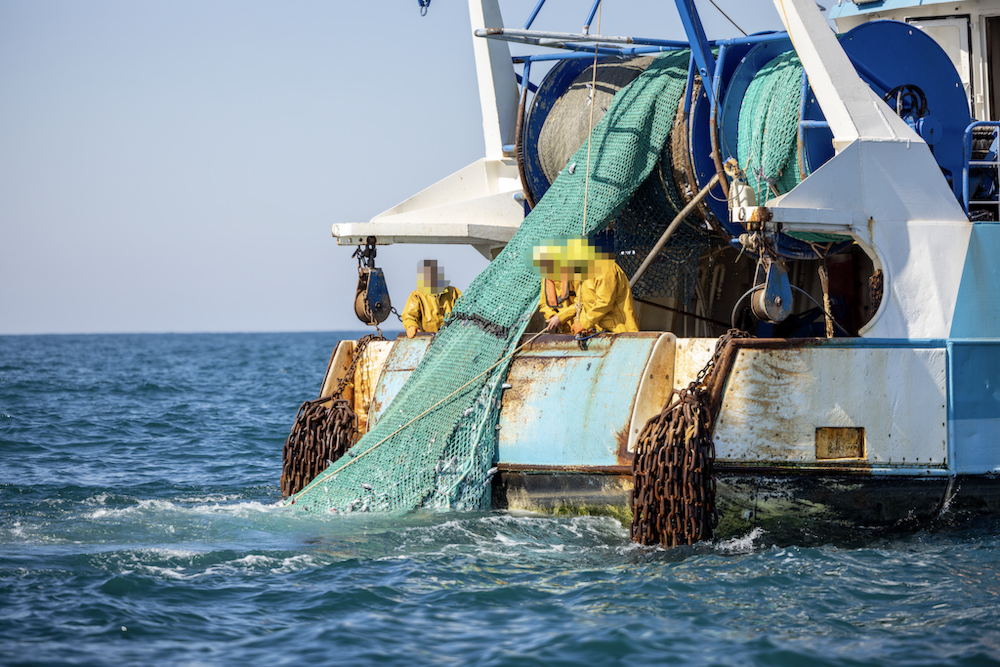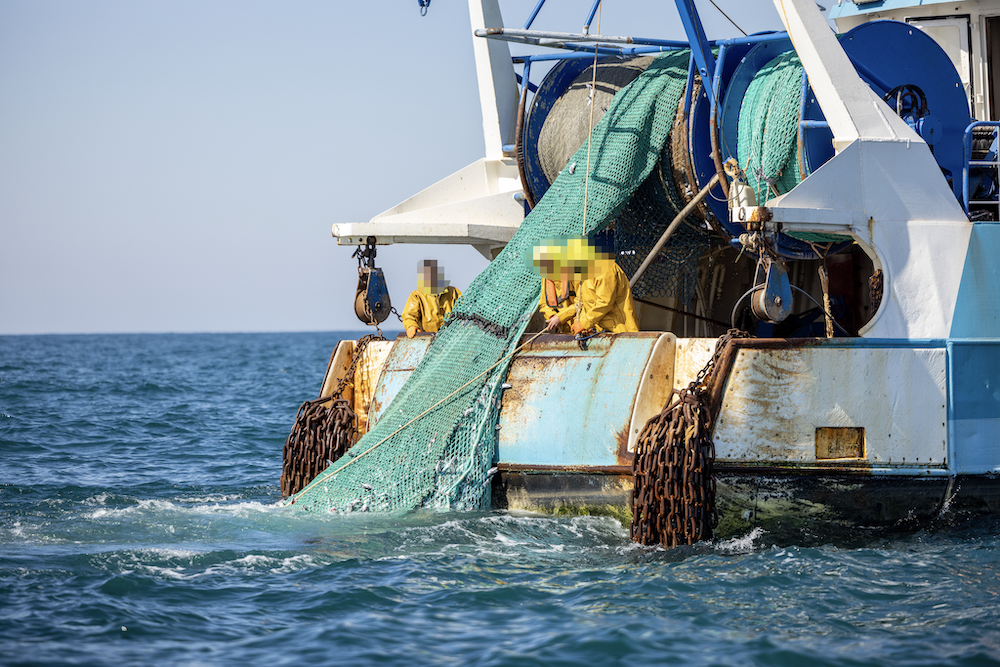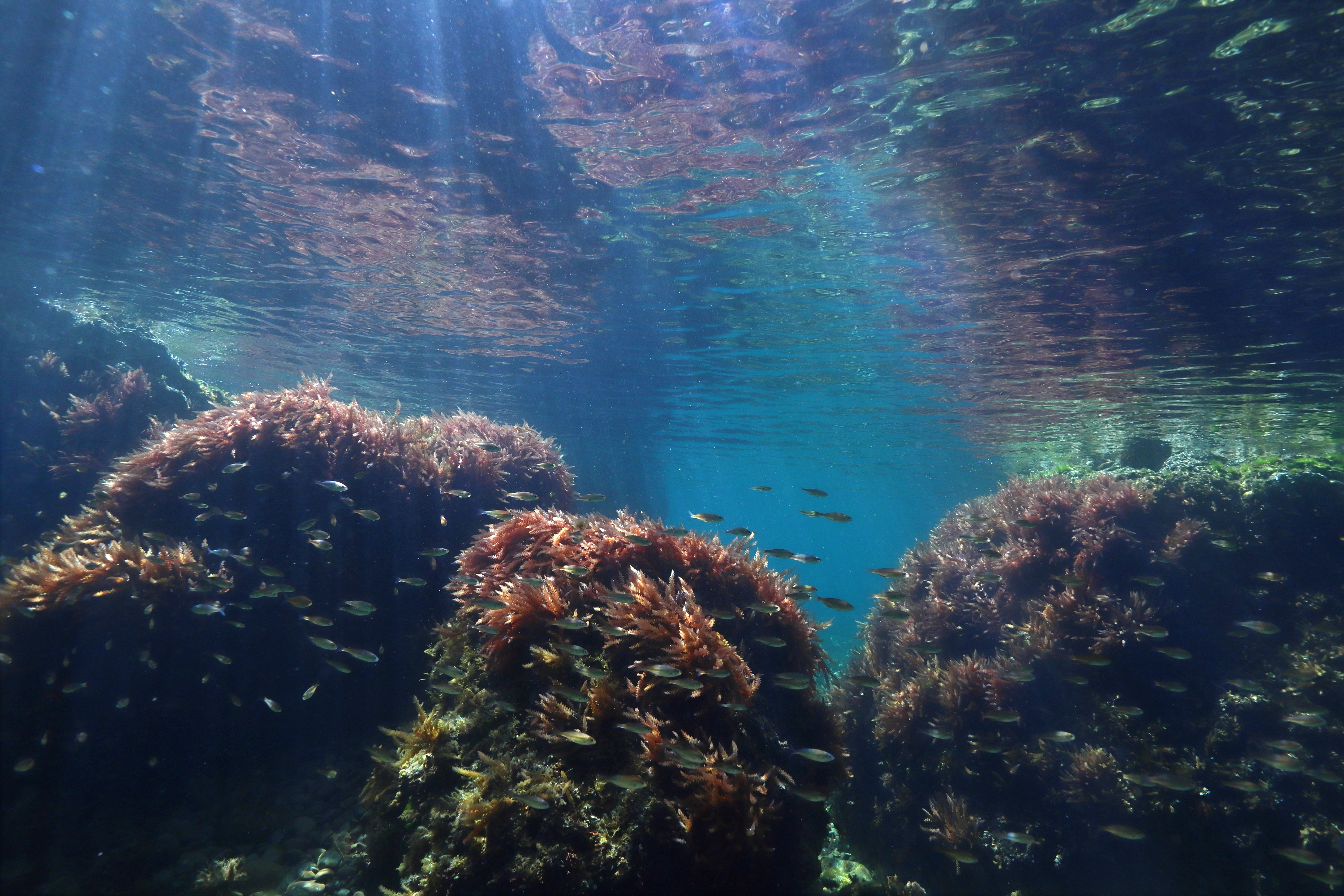
Ocean advocates launch ‘Protect Our Catch’, a European campaign, urging French President Macron and the EU to end destructive fishing such as bottom trawling in marine protected areas
Protect Our Catch is a new European campaign supported by leading ocean advocates BLOOM, Blue Marine Foundation, Empesca’t, Environmental Justice Foundation, Oceana, Only One, Seas At Risk and Tara Ocean Foundation, in collaboration with fishers, that joins hundreds of thousands of citizen activists is calling on European leaders to ban destructive fishing such as bottom trawling in marine protected areas (MPAs). In so doing, it confronts two critical and related issues: supporting the future of small-scale fishing while protecting and restoring marine ecosystems.
In letters sent this week to French president, Emmanuel Macron and EU Commissioner for Fisheries and Oceans, Costas Kadis, the campaign has said that without urgent action on destructive fishing methods such as bottom trawling, Europe’s supposed marine protected areas risk being stripped of marine life, with devastating consequences for small-scale fishers, biodiversity and the fight against climate change.
Bottom trawling, a destructive fishing method in which heavy nets are dragged along the seabed, continues to devastate marine ecosystems and biodiversity, even in supposed marine protected areas (MPAs) - a designated region of the ocean where human activity is managed or restricted to safeguard resources and ecosystems. Among fishing practices, bottom trawling is the leading contributor of CO2 release through heavy fuel consumption and disturbance of marine sediments, and has an impact on small-scale fishers and local economies, putting coastal communities in jeopardy.
In June 2022, President Macron said that the world must “set ambitious goals for biodiversity and especially for ocean.” However, addressing the French president, the campaign argues the country has failed to make any "meaningful progress” on banning destructive fishing practices such as bottom trawling in its protected areas, a stance that threatens France’s claim to be a steward of the ocean.
Simultaneously, the campaign has urged EU leadership in the Parliament and Commission including Commissioner Kadis — to double down on enforcement of existing EU regulations, especially the Habitats Directive, and take action to end destructive fishing such as bottom trawling in MPAs. Protect Our Catch and its members will campaign throughout the year in Brussels for this action.
With public support for stronger marine protection growing across Europe, polls indicate 90% believe MPAs are essential for preserving marine biodiversity, and 73% would support a ban on bottom trawling within protected areas. Further, hundreds of thousands of citizen activists across Europe have taken action in supporting an end to bottom trawling in MPAs.
Isaac Moya, a fisherman in Catalunya and co-founder of sustainable fisheries collective Empesca’t, urged the Commissioner to take a stand for sustainable practices, saying "As small- scale fishers, we rely on traditional, low-impact methods that respect the ocean and our culture. However, industrial and bottom trawling in marine protected areas threaten our future. To ensure the continuity of our profession, it is essential to protect and promote artisanal fishing."
Federico Gelmi, a low-impact fisher, from Pantelleria, Italy, said: “Bottom trawling in MPAs is incompatible with sustainable fishing. The science is clear and the fishing tells the same story, we need to protect our ocean if we are to continue fishing.”
Claire Nouvian, Founder & General Director, BLOOM, said: “Today, France is responding to the climate, social and environmental emergency with inaction and deception. This must and can change: we have no choice, as all scientists say, but to stop destroying the ocean and to finally protect it. The future of the ocean, the climate, and humanity, lies in the balance. President Macron must rise to the challenge and respond to the challenges we face by creating genuine marine protected areas, free from industrial infrastructure and activities such as trawling, by excluding mega-trawlers from our territorial waters, in order to protect ecosystems and coastal fishers, and by advocating for a treaty and legislation on the non-proliferation of fossil fuels”
Clare Brook, CEO of the Blue Marine Foundation, said: “Bottom trawling is a damaging and
indiscriminate fishing method which ploughs up precious habitats, decimates biodiversity and depletes the ocean’s ability to sequester carbon. Yet this highly destructive type of fishing is still allowed in the majority of marine protected areas. We must ensure that bottom trawling is excluded from all marine protected areas without exception.”
Steve Trent, EJF CEO and founder, said: “Most European 'Marine Protected Areas' are just lines on a map, paper parks which do nothing to stop the ongoing destruction of vital habitats. The laws are clear, and the science is unequivocal. Bottom trawling is incompatible with marine protected areas, and we urgently need action to ban it. 79% of the EU’s coastal seabed is physically disturbed, primarily because of this trawling, with a quarter of the EU’s coastal area likely having lost its natural seabed habitats. I call on our leaders to stand up for wildlife, people and our ocean now.”
Nicolas Fournier, Campaign Director at Oceana in Europe, said: “As political momentum is growing ahead of the UN Ocean Conference in June, EU leaders can’t continue to ignore the public outcry about the destruction of protected areas by bottom trawling, as hundreds of thousands of EU citizens want meaningful marine protection. We urge the European Commission to particularly recognise in its future Ocean Pact how MPAs help protect fishers’ livelihoods and support coastal communities, including to counter the impacts of climate change on people.”
Tatiana Nuño, Senior Marine Policy Officer from Seas At Risk, said: “At a time when the EU is laser focused on competitiveness, it’s vital that MPAs are recognised as key to building a sustainable blue economy that promotes both a healthy ocean and a healthy economy. Not only do MPAs help recover fish stocks and support sustainable fishing jobs – they also benefit the EU economy with projections showing that a ban on bottom trawling in them would create a cumulative profit of more than €8 billion over 20 years. If Commissioner Kadis is serious about creating an EU Ocean Pact that delivers for people and the planet alike then it’s high time the taboo around banning bottom trawling is cast aside.”
Media Contact:
Alice Lorfeuvre
Email: media@protectourcatch.org
Whatsapp: +33646278607
About BLOOM
BLOOM is a non-profit organization founded in 2005 that works to preserve the marine environment and species from unnecessary destruction and to increase social benefits in the fishing sector. BLOOM wages awareness and advocacy campaigns in order to accelerate the adoption of concrete solutions for the ocean, humans and the climate. BLOOM carries out scientific research projects, independent studies and evaluations that highlight crucial and unaddressed issues such as the financing mechanisms of the fishing sector. BLOOM’s actions are meant for the general public as well as policy-makers and economic stakeholders.
About Blue Marine Foundation
Blue Marine is a UK ocean conservation charity set up in 2010 by some of the team behind the award-winning documentary film ‘The End of the Line’. Blue Marine aims to restore the ocean to health by addressing overfishing, one of the world’s biggest environmental problems. The charity is dedicated to creating marine reserves, restoring vital habitats and establishing models of sustainable fishing. Its mission is to see at least 30 per cent of the ocean under effective protection by 2030 and the whole ocean responsibly managed.
About Environmental Justice Foundation
EJF works internationally to inform policy and drive systemic, durable reforms to protect our environment and defend human rights. We investigate and expose abuses and support environmental defenders, Indigenous peoples, communities and independent journalists on the frontlines of environmental injustice. Our campaigns aim to secure peaceful, equitable and sustainable futures.
About Oceana
Oceana is the largest international advocacy organisation dedicated solely to ocean conservation. Oceana is rebuilding abundant and biodiverse oceans by winning science-based policies in countries that control one-quarter of the world’s wild fish catch. With more than 300 victories that stop overfishing, habitat destruction, oil and plastic pollution, and the killing of threatened species like turtles, whales, and sharks, Oceana’s campaigns are delivering results. A restored ocean means that 1 billion people can enjoy a healthy seafood meal every day, forever. Together, we can save the oceans and help feed the world. Visit europe.oceana.org to learn more.
About Only One
Only One runs campaigns that change minds and shape policy. Our international team of experts specializes in strategic communications, movement building, and public advocacy to drive impactful ocean and climate policy worldwide. Our philanthropically funded work aims to complement and enhance the efforts of others both globally and in targeted regions to restore ocean health for all and realize the ocean’s potential as a climate solution.
About Seas At Risk
Seas At Risk is a Brussels-based NGO campaigning for the protection and restoration of the marine environment. Together with its 30+ members from all over Europe, it works to make sure that life in our seas and oceans is abundant, diverse, climate-resilient, and not threatened by human activities.
About Tara Ocean Foundation
The Tara Ocean Foundation is the first public interest foundation in France dedicated to the Ocean. For over 20 years, it has been striving for a revolution to preserve life, convinced that the Ocean is essential to the equilibrium of our planet. Exploring the Ocean and sharing scientific discoveries to raise collective awareness is at the heart of the foundation's mission. It leads scientific expeditions, in partnership with leading international research laboratories, to study marine biodiversity and understand the impacts of climate change and pollution. It raises public awareness, from the younger generation to political decision-makers. Thanks to its UN Special Observer Status, the foundation plays an active role in international Ocean governance. Exploring, sharing and protecting this living Ocean is more vital than ever. Together, let's defend life. Let's protect the Ocean.
SIGN UP FOR OUR EMAILS AND STAY UP TO DATE WITH EJF

